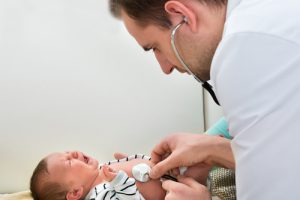
With the home state of U.S. Rep. Evan Jenkins (R-WV) gaining the first federal approval to offer treatment for neonatal abstinence syndrome (NAS), the congressman this week reiterated his call for quick advancement of related bipartisan legislation pending in both chambers of Congress.
The U.S. Centers for Medicare and Medicaid Services (CMS) on Feb. 8 approved an amendment to the West Virginia State Medicaid Plan that permits the state health department’s Bureau for Medical Services to offer treatment for NAS, a postnatal addiction and withdrawal condition that results from the abrupt discontinuation of chronic fetal exposure to substances that were used or abused by the mother during pregnancy. NAS is most often caused by a pregnant woman’s use of opioids like morphine, methadone and oxycodone, but also occurs from other drug use, including heroin, antidepressants and methamphetamines.
“Since before coming to Congress, I have worked to help the most innocent victims of the drug crisis — newborn babies exposed to opioids and other drugs during pregnancy. The cries of these tiny babies are heartbreaking, and they deserve every chance we can give them to live happy, healthy lives,” said Rep. Jenkins. “Thanks to this decision, West Virginia will be able to help even more newborns and continue to lead the way in innovating models of care for NAS.”
“West Virginia is facing an opioid epidemic like no other state is experiencing,” said Cindy Beane, commissioner of the West Virginia Department of Health and Human Resources Bureau for Medical Services. “This critical designation will allow us to treat the most vulnerable, innocent victims affected by this horrible crisis,” she said in a written statement.
With the CMS approval, the Huntington, W.Va.-based Lily’s Place medical care facility in Jenkins’ district is designated by West Virginia Medicaid as a NAS treatment center, and now faces less regulatory red tape in caring for drug-exposed newborns, according to the congressman’s office.
Such CMS approvals are needed nationwide, said Jenkins, who called on Congress to take up his bipartisan Caring Recovery for Infants and Babies (CRIB) Act, H.R. 2501, which he introduced on May 17, 2017 with original cosponsors U.S. Reps. Michael Turner (R-OH), Tim Ryan (D-OH), and Katherine Clark (D-MA). Among the bill’s 26 cosponsors are U.S. Reps. Bruce Poliquin (R-ME), Rodney Davis (R-IL), Tom MacArthur (R-NJ), and Dan Donovan (R-NY).
Specifically, H.R. 2501 would amend the Social Security Act to allow states with Medicaid programs to cover inpatient or outpatient services at residential pediatric recovery centers for infants with NAS and their families, according to a congressional record summary of the bill. This would “provide certainty for NAS treatment centers across the nation to ensure all newborns have a chance at a healthy start at life,” Jenkins said on Feb. 13.
Rebecca Crowder, executive director of Lily’s Place, supports Congress passing the CRIB Act “to provide a permanent fix to this issue and allow even more centers like Lily’s Place to open nationwide.”
Similarly, the U.S. Government Accountability Office concluded in an October 2017 report that CMS-oversight agency, the U.S. Department of Health and Human Services (HHS), “expeditiously address NAS,” but noted that implementation of an HHS strategy would be contingent on federal funding.
U.S. Sen. Shelley Moore Capito (R-WV) also on May 17, 2017 introduced related legislation, S. 1148, in the U.S. Senate with Sen. Sherrod Brown (D-OH) that has been referred to the Senate Finance Committee.
H.R. 2501 awaits consideration by the House Energy and Commerce Subcommittee on Health.



